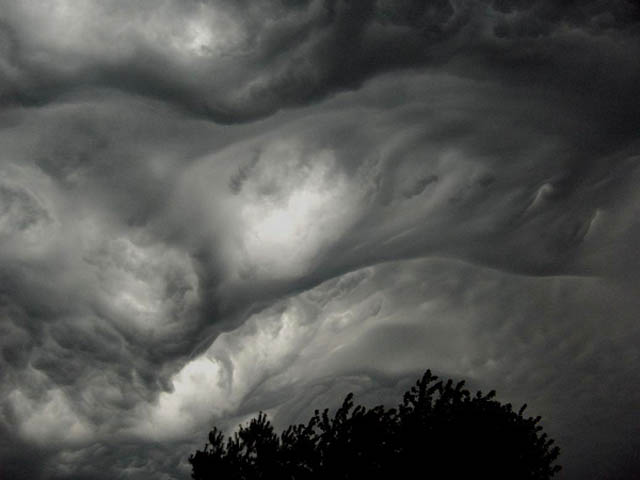Majestic Skies Created by Powerful Storms
Since our last "Mammatus, Lenticular & Other Extreme Clouds" article, the good old Nature kept giving the photographers great opportunities for stunning shots. Problem is, great celestial displays are often followed by some nasty storms... which hardly anybody would want to witness firsthand.
We'll start with a "Clouds Beauty Contest". Most sources are listed directly under the photos, though some original credits remain unknown. We mentioned "Clouds Appreciation Society" as a premier destination for cloud-watchers & photographers before, and it remains the "one-stop" website with more and more spectacular submissions every day. Among the other sources of this article, you will see a few examples out of thousands worthy pictures displayed there.
Cloud "Explosions" - Cumulonimbus cloud formations, building up to powerful storms.


(photos credit: Karen Titchener, Cloud Aprreciation Society)
(photo credit: Mike Adkinson)
(image credit: "King Herald" Paul)
(photo credit: Cobalt Osanga)
Crown of Glory:
(photo credit: John Deed)
In this picture both lenticular and mammatus clouds combine in one crazy rippled texture, after the passing of a powerful storm:
(photo credit: Martha Tenney)
A storm front moves over Niagara Falls Air Reserve Station:
((U.S. Air Force photo by Senior Master Sgt. Ray Lloyd))
Clouds with an interesting shapes:
Angel wings -
(original unknown)
This picture was sent to us by Greg Hewgill.
He describes it as a trail left from a missile test:
(photo by Greg Hewgill)
Watching clouds & seeing shapes becomes a theme in the "Amelie" movie:
("Le Fabuleux destin d'Amélie Poulain") -

It also shows how easy it is to make these shapes by Photoshop. The following series of pictures, though, is definitely real and appeared in Daily Mail. The most unusual ones are "the six-legged sky pig":
(photo by Ian Loxley)
and a "head of the sky dragon":
(photo by Felicity Norman)
Tornados & Wall Clouds
First, the most fantastic picture - the storm structure captured in its entirety, over Red Cloud, Nebraska. The linked page describes the damage that was wreaked by the accompanying tornado.
(image credit: Doug Raflik)
The blackness is palpable in this picture:
(and yes, there is 500-meter wide tornado in there somewhere)
(image credit: Ryan McGinnis)
A wall cloud developing under the anvil of a powerful storm is often a tornado waiting to happen... as seen on these ominous pictures:
(image credit: Colin Morris)
Over Veghel, NoordBrabant, Holland:
(image credit: Roel Kouwenberg)

(original unknown)
Tornados & Rainbows At Once
(image credit: Jurg Beeli, Cloud Aprreciation Society)
We are also reminded by the saying on his site that "It's hard to enjoy the fascination of storm chasing when people are getting hurt" (Alan Moller), so the combination of rainbows and tornadoes is really quite symbolic.
More recent shots of tornadoes, unfortunately uncredited:


(original unknown)
Rachel Rusinski took the following two pictures of Midwest storm looming over the plains in the morning. Right place + right time = amazing photography...

(images credit: Rachel Rusinski)
A couple of particularly spectacular lenticulars:
(or lenticular spectaculars)
Here is the "mother ship" over Lake Tahoe:
(image credit: Bryan Hightower)
Over Nairn in Scotland:
(image credit: Ulrich Brieger)
The winter is coming. Look up to see the dancing northern lights:
Northern lights over the erupting volcano!
The photo above came from the most fascinating collection of northern lights pictures by Sigurour H. Stefnisson. Make sure to click on this link to enjoy their beauty.
Nacreous Clouds
Nacreous Clouds, or Mother-of-Pearl Clouds are a pretty common sight in the northern countries (like the ones shown here over Norway), when the sun is low on the horizon in December and January. They are also called "polar stratospheric clouds". They are best visible in the early dawn of after dusk, because they reflect sunlight from below the horizon (due to their extreme altitude and curvature of the Earth). They also play a certain role in decreasing the ozone layer by bringing up the gaseous nitric acid and disturbing the delicate cycles of the stratosphere.
(image credit: Derrick Rethans)
(image credit: Pvv.org)








0 comments:
Post a Comment